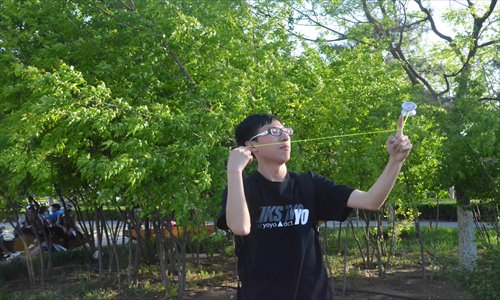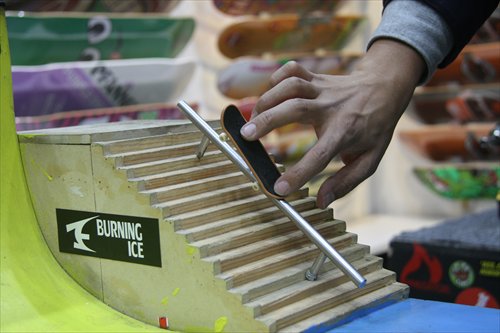

Huang Chang intends to popularize the yo-yo in China. Photo: Courtesy of Huang Chang

Yang Zi plays the finger skateboarding. Photo: Courtesy of Yang Zi
While still at high school, Li Xuhui, now a 20-year-old sophomore at Guangzhou Panyu Polytechnic, would spend up to three hours everyday practicing how to spin a pen.
"At first, I was a little clumsy," said Li. "It takes around half a year to get decent at it."
For the uninitiated, pen spinning involves contorting one's fingers in order to perform tricks with a writing instrument. A popular pastime in schools, it has developed into a legitimate alternative hobby, with sanctioning associations and organized competitions around the world. Pserhome, an association dedicated to pen spinning in China, currently has more than 160,000 members.
In the hands of an experienced practitioner, pen spinning is a flurry of perpetual motion that requires astonishing dexterity and coordination.
"The most satisfying part of pen spinning is when you finally master a new move," said Li. "It means you can do things with your fingers that other people can't do."
Pen spinning is just one of a number of hand-coordination based hobbies in China that have started to emerge from obscurity, with a recent Guangzhou Daily report coining the term "extreme hand sports" to describe the fad. Other such pastimes include stacking cups, the Japanese game of kendama, in which tricks are performed using a gavel-like apparatus attached to a ball with string, and finger skateboarding, where miniature boards around 10 centimeters in length are maneuvered using a person's hands.
Yang Zi, an actual skateboarder who owns two skateboarding shops in Beijing, took up the miniature version of the sport in 2008. He was intrigued by finger skateboarding after watching a video of it online, and sees it as a natural extension of his passion for the real thing.
"What I found interesting about finger skateboarding is that you can do [normal skateboarding] tricks in slow motion, so people can appreciate the beauty of every move," said Yang, 35. "The slower you can control the finger skateboard, the higher your degree of mastery."
Yang said that the sport remains niche in China, with less than 1,000 enthusiasts, almost all of whom are regular skateboarders as well. Around the world however, Yang estimated there were more than 100,000 people who were active in the finger skateboarding community, sharing videos of their nimble acrobatics and engaging in informal competitions.
Perhaps the most familiar of the "extreme hand sports" is the humble yo-yo. Far from being a mere childhood diversion, for the best yo-yo players, it is now a veritable way to make a living, through sponsorships from toy manufacturing companies and live performance engagements. The World Yoyo Contest, held in Prague this year, attracted more than 1,000 competitors.
Huang Chang, a 21-year-old college student in Beijing, hopes to one day join the ranks of yo-yo professionals. His yo-yo idol is Hiroyuki Suzuki, a four-time winner of the World Yoyo Contest.
"I've modeled all of my moves and techniques on [him]," said Huang, who admitted that the practice has resulted in his fair share of injuries, such as being smashed in the head when he failed to catch a throw.
In 2013, Huang competed in the sOMEThING World competition in Shanghai, finishing 120th out of 180 competitors.
"My goal is to continue promoting the sport and to change the perception that the yo-yo is just a toy," he said.
Copyright ©1999-2018
Chinanews.com. All rights reserved.
Reproduction in whole or in part without permission is prohibited.